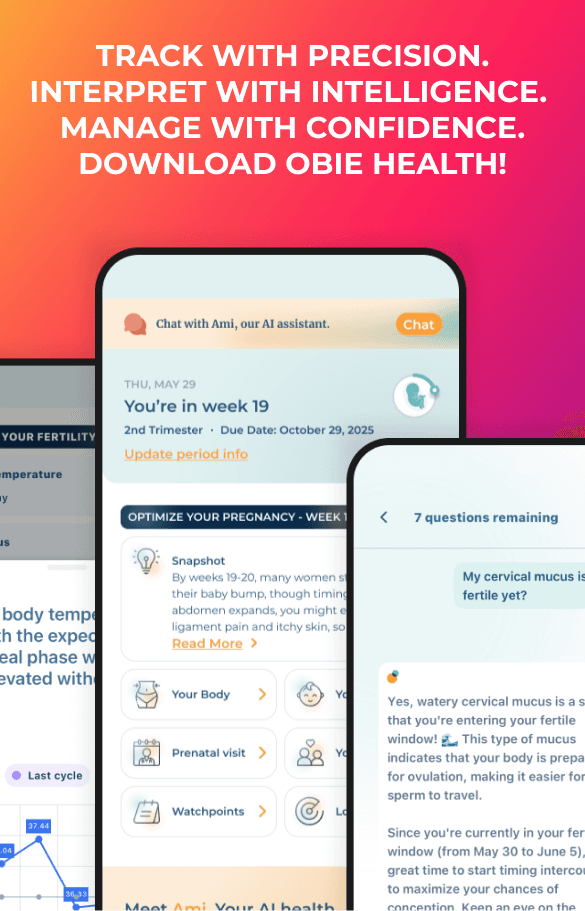How Menstruation Affects Your Body's Defenses
Obie Editorial Team

Your immune system shifts with your cycle, making some phases more vulnerable to illness and inflammation than others.
Hormones aren’t just about mood swings or cramps—they’re intricately tied to how your immune system behaves throughout your menstrual cycle. If you’ve ever wondered why you feel more run-down, inflamed, or even get sick more easily at certain times of the month, the answer may lie in the natural fluctuations of estrogen and progesterone. These two hormones do more than regulate ovulation—they influence your body’s immune defenses, making some phases of your cycle more prone to inflammation and others more protective.
Understanding this cyclical pattern of immune modulation isn’t just interesting—it’s empowering. Whether you’re managing an autoimmune condition, trying to optimize training and recovery, or simply want to feel more in sync with your body, knowing how your immune system shifts throughout your cycle can help.
The Immune System’s Monthly Rhythm
Your menstrual cycle is composed of two main hormonal phases: the follicular phase (starting on the first day of your period and ending at ovulation) and the luteal phase (from ovulation to the start of your next period). Each of these phases is dominated by different hormones that can either calm or stimulate immune responses.
- Estrogen, which rises during the follicular phase and peaks around ovulation, has predominantly anti-inflammatory effects. It helps stabilize immune responses and enhances the body’s ability to fight off pathogens.
- Progesterone, which rises during the luteal phase, has more pro-inflammatory effects. While this is a natural and necessary part of preparing the body for a potential pregnancy, it can also increase susceptibility to inflammation and illness.
What This Means for You
Research has shown that these hormonal shifts can influence everything from how your body responds to viruses to whether autoimmune symptoms flare up (Notbohm et al., 2023). Women may experience subtle but meaningful changes in immune function across the cycle, including:
- Increased inflammation and greater risk of infection during the luteal phase
- Enhanced immune response and resilience to illness in the follicular phase
- More pronounced autoimmune flare-ups, such as joint pain or fatigue, during progesterone-dominant days
Practical Ways to Support Your Immune Health Across the Cycle
Tracking your cycle isn’t just for fertility—it’s a powerful tool for managing your immune health. Knowing which phase you're in can better tailor your wellness strategies. Here are some simple, cycle-aware practices:
During the Follicular Phase (Day 1 to Ovulation):
- Focus on moderate-intensity exercise, which can enhance the immune benefits of this phase
- Incorporate nutrient-rich foods, especially those high in antioxidants (like leafy greens and berries)
- Use this time to recover from illness or stressors, as your immune system is generally more robust
During the Luteal Phase (Ovulation to Period Start):
- Prioritize sleep and stress management to counteract inflammation
- Reduce exposure to sick contacts if you're more prone to infection during this time
- Consider anti-inflammatory foods like omega-3 fatty acids (found in salmon, flaxseeds, and walnuts)
- Stay hydrated and avoid overexertion, especially if you notice energy dips
Managing Chronic Illness and Autoimmune Conditions
Cyclical immune shifts can be more noticeable and disruptive for women living with autoimmune diseases or chronic inflammatory conditions. Planning ahead for flare-prone phases can reduce symptom intensity. This might mean adjusting medications with your provider, building in more rest days, or preparing supportive meals in advance. It's not about avoiding the luteal phase but about respecting what your body needs during that time.
What the Research Says
In a 2023 systematic review and meta-analysis, Notbohm et al. evaluated how immune function and inflammation vary across the menstrual cycle, both at rest and in response to exercise. The findings supported the idea that immune markers fluctuate in sync with hormonal changes, particularly noting increased inflammation and altered immune responses during the luteal phase (Notbohm HL et al., Acta Physiol. 2023; 238:e14013. doi:10.1111/apha.14013). This further validates what many women experience intuitively—your immune system does not operate the same way every day of the month.
Source:
Notbohm HL, Moser F, Goh J, Feuerbacher JF, Bloch W, Schumann M. The effects of menstrual cycle phases on immune function and inflammation at rest and after acute exercise: A systematic review and meta-analysis. Acta Physiol (Oxf). 2023 Aug;238(4):e14013. doi: 10.1111/apha.14013. Epub 2023 Jun 24. PMID: 37309068.







